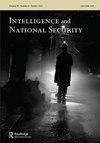工业情报、赔偿和德国专业知识:澳大利亚派往德国的科学技术使团,1945-1950
IF 0.8
3区 社会学
Q1 HISTORY
引用次数: 0
摘要
本文章由计算机程序翻译,如有差异,请以英文原文为准。
Industrial intelligence, reparations, and German expertise: the Australian Scientific and Technical Mission to Germany, 1945-1950
ABSTRACT Among the multiplicity of missions that the Allied governments and armed forces sent to Europe towards the end and after World War II to document and exploit Nazi Germany’s wartime scientific and industrial progress was the Australian Scientific and Technical Mission to Germany. Composed of less than a dozen personnel, the Mission was a modest but important component in the Australian Commonwealth Government’s post-war foreign policy towards Germany and expansion of scientific and industrial development. Based at Australia House in London, the Mission worked in close cooperation with British Government departments, and was instrumental in the transnational transfer of German science and technology to Australia between 1946 and 1950 – initially under the auspices of the British Intelligence Objectives Sub-committee, and later through the Inter-Allied Reparation Agency and the Employment of Scientific and Technical Enemy Aliens scheme.
求助全文
通过发布文献求助,成功后即可免费获取论文全文。
去求助
来源期刊

Intelligence and National Security
Multiple-
CiteScore
1.80
自引率
41.70%
发文量
93
期刊介绍:
Intelligence has never played a more prominent role in international politics than it does now in the early years of the twenty-first century. National intelligence services are larger than ever, and they are more transparent in their activities in the policy making of democratic nations. Intelligence and National Security is widely regarded as the world''s leading scholarly journal focused on the role of intelligence and secretive agencies in international relations. It examines this aspect of national security from a variety of perspectives and academic disciplines, with insightful articles research and written by leading experts based around the globe. Among the topics covered in the journal are: • the historical development of intelligence agencies • representations of intelligence in popular culture • public understandings and expectations related to intelligence • intelligence and ethics • intelligence collection and analysis • covert action and counterintelligence • privacy and intelligence accountability • the outsourcing of intelligence operations • the role of politics in intelligence activities • international intelligence cooperation and burden-sharing • the relationships among intelligence agencies, military organizations, and civilian policy departments. Authors for Intelligence and National Security come from a range of disciplines, including international affairs, history, sociology, political science, law, anthropology, philosophy, medicine, statistics, psychology, bio-sciences, and mathematics. These perspectives are regularly augmented by research submitted from current and former intelligence practitioners in several different nations. Each issue features a rich menu of articles about the uses (and occasional misuses) of intelligence, supplemented from time to time with special forums on current intelligence issues and interviews with leading intelligence officials.
 求助内容:
求助内容: 应助结果提醒方式:
应助结果提醒方式:


